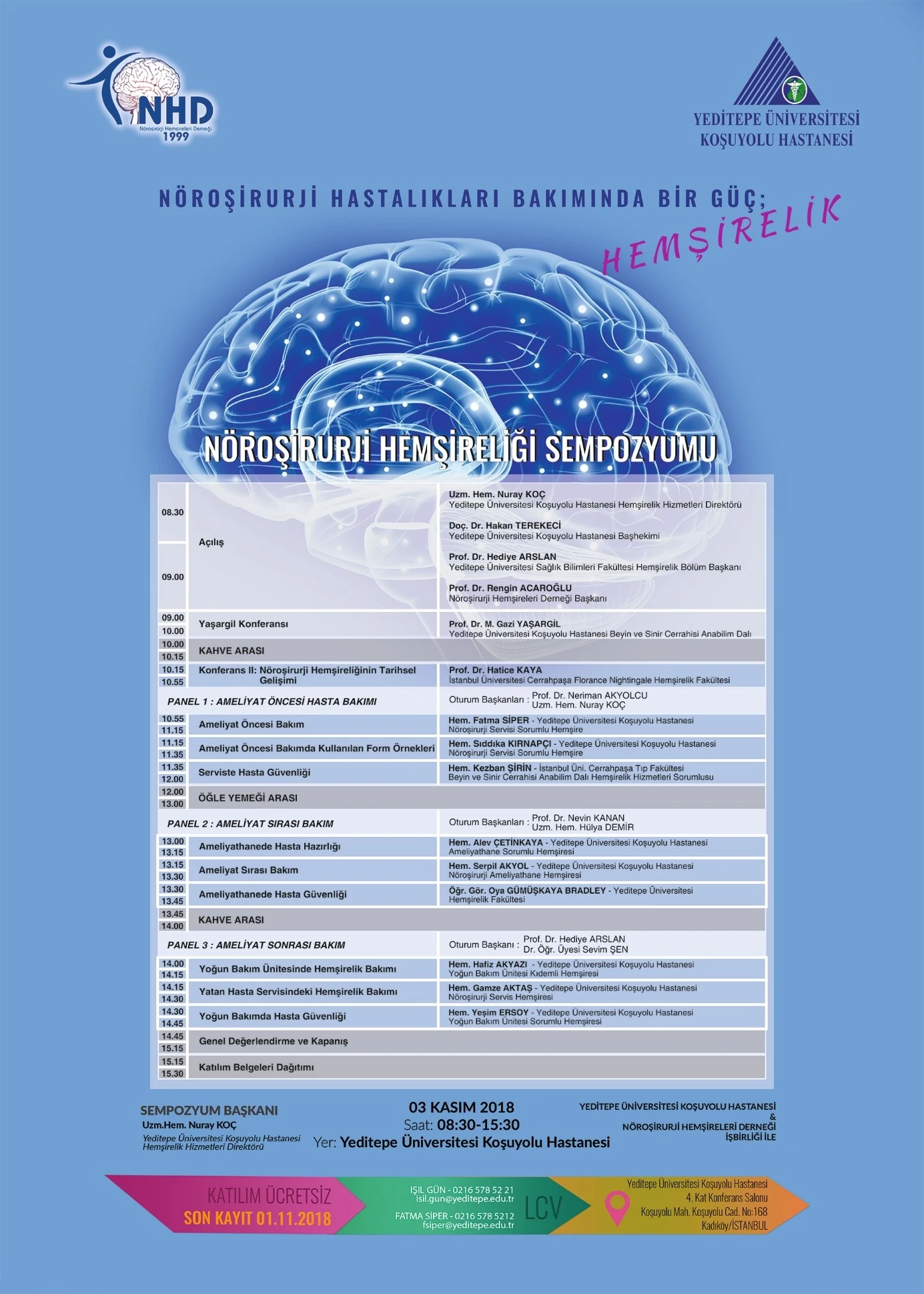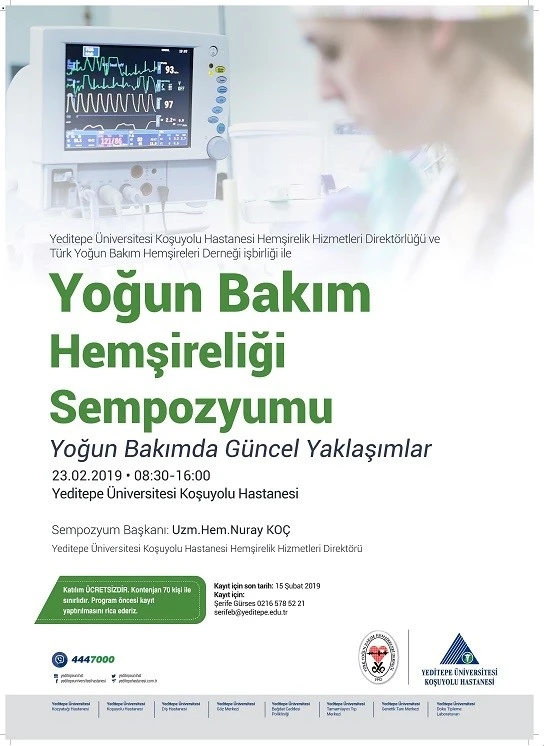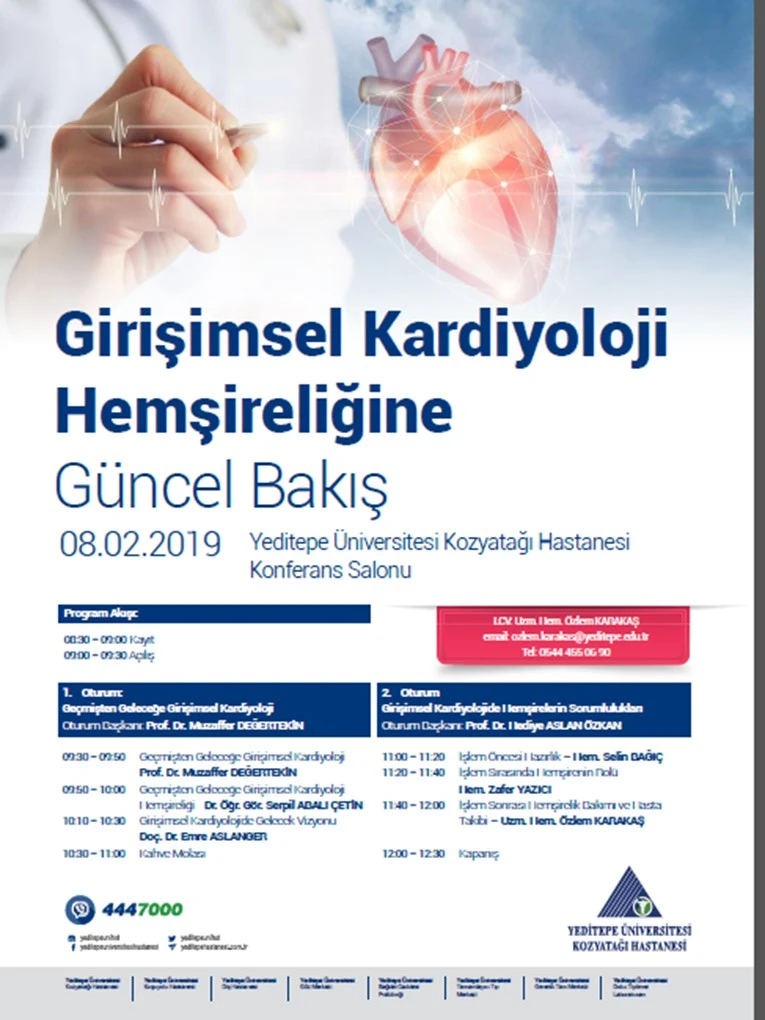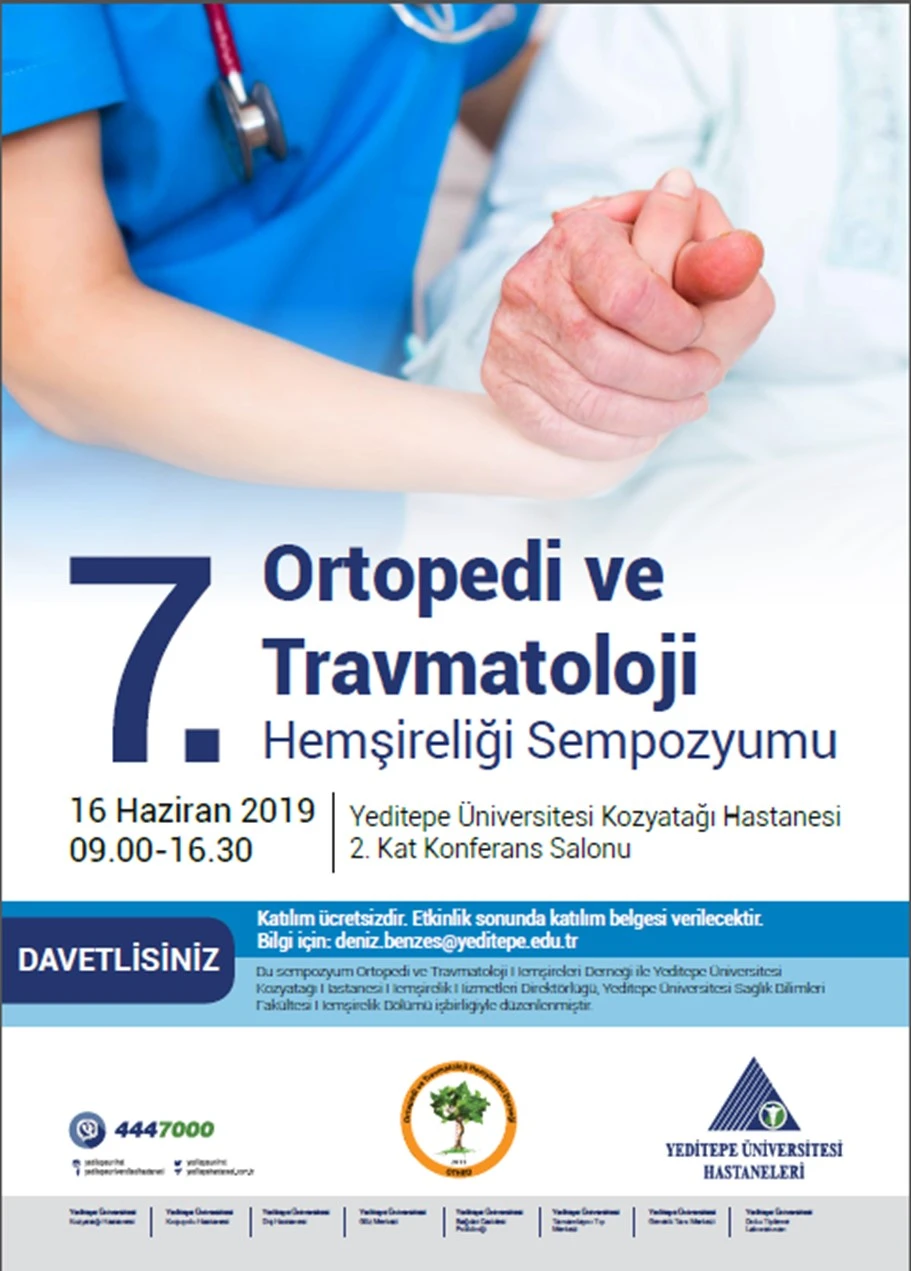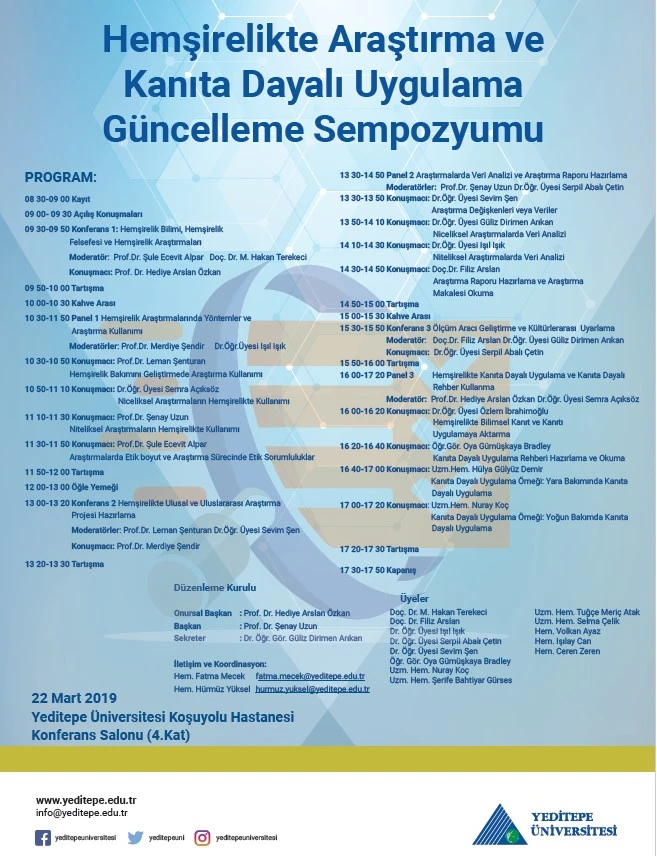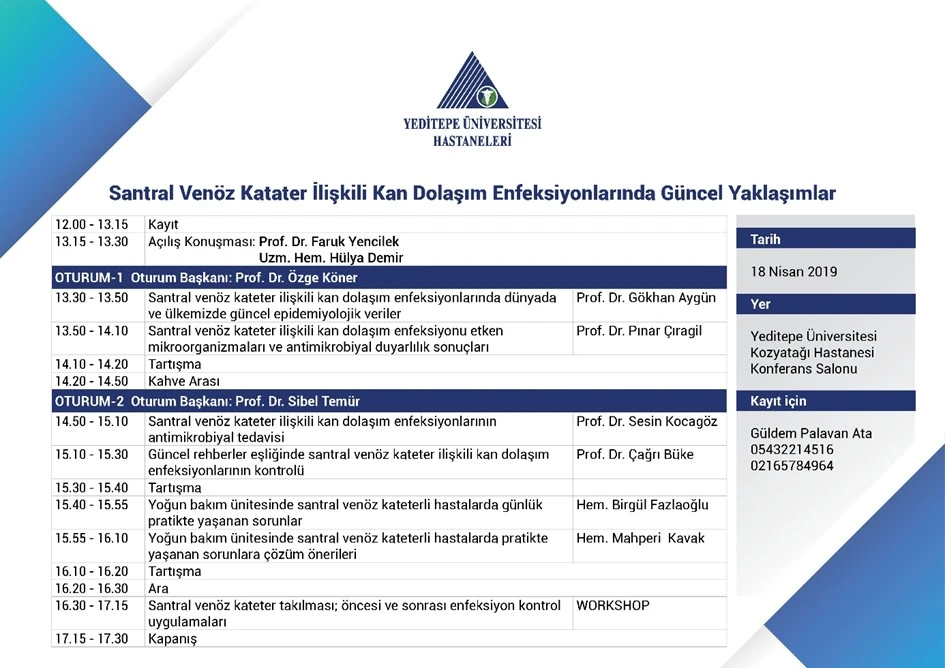Alo Yeditepe
Alo Yeditepe
Nursing Services
Mission
In light of the values of Yeditepe University Hospitals, in order to protect and improve the health of individuals and society, to provide the quality patient care required in the changing conditions of the healthcare environment at the highest standards required by the age;
- As well as using advanced maintenance technologies,
- Employees who are engaged in continuous training and development activities, have a team approach, and are happy,
- Respectful to patient rights and ethical principles,
- We aim to provide nursing services based on scientific evidence and prioritize patient and employee safety principles.
Vision
To be an academic health institution that offers the highest standards of nursing care in the world with a management approach that increases employee happiness, and pioneers innovation and difference in nursing education, science, and modern patient care.
Our Approach
At Yeditepe University Hospitals Nursing Services, we believe that it is important for individuals to take responsibility for their own health in protecting and improving the health of society, that this awareness can be created through education and guidance; that nursing services with modern technology, scientific approach, patient safety understanding are important in providing the highest quality care to individuals with impaired health, and that this goal can be achieved through continuous development activities and evidence-based practices.
With this in mind,
- For the community and the group, we serve;
- We organize training programs to protect and improve their health,
- We prioritize patient safety in every area we serve,
- We provide nursing care in accordance with patient rights and ethical principles,
- We follow the most up-to-date technology used in modern patient care and reflect it in our care practices,
- We support Evidence-Based Nursing Practices and reflect them in our patient care.
For our nurses;
- We provide a happy and peaceful working environment,
- With a high communication network, we create a reassuring bridge between employees and management,
- We implement performance evaluation and development programs,
- We offer training and continuous development opportunities,
- We implement health programs to protect employee safety.
For the development of the nursing profession;
- We support in-house nursing research,
- We offer scientific work opportunities to our academic colleagues,
- We provide internship opportunities for nursing school students under exemplary conditions,
- We establish educational cooperation with universities for nursing,
We organize training programs for the development of our colleagues from different institutions.
Pain Nursing
- Emergency Medicine Nursing
- Operating Room Nursing
- Care Improvement Nursing
- Surgical Nursing
- Diabetes Nursing
- Education Nursing
- Endoscopy Nursing
- Infection Control Nursing
- Angiography Nursing
- Hemodialysis Nursing
- IVF Nursing
- Internal Medicine Nursing
- Obstetrics and Gynecology Nursing
- Cardiovascular Surgery Nursing
- Chemotherapy Nursing
- Coronary Intensive Care Nursing
- Neurological Sciences Nursing
- Nuclear Medicine Nursing
- Oncology and BMT Nursing
- Orthopedic Nursing
- Pediatric Nursing
- Neonatal Intensive Care Nursing
- Sterilization Nursing
- Urology Nursing
- Intensive Care Nursing
Respiratory Therapy Nursing
Specialist Respiratory Therapy Nurses (Respiratory Therapists) and Respiratory Therapy Nurses work in Yeditepe University Hospital and Affiliated Institutions in order to provide respiratory therapy services to patients receiving treatment, perform pulmonary function tests, and carry out bronchoscopy procedures for diagnosis and treatment. Respiratory Therapy Nurses work in coordination with the relevant branch physicians.
The greatest strength of Yeditepe University Hospital and Affiliated Institutions in providing quality and safe nursing care is its trained and educated nurses.
Various activities are organized by the Education Coordinators to ensure the training and development of nurses in our institution. With these activities, the experts of their subjects provide the most up-to-date information, and it is aimed to increase the motivation and support their individual development by ensuring that nurses take part as instructors.
Apart from the trainings organized within the institution, all our nurses are provided with the support of our institution to participate in certificate programs and scientific meetings in line with their fields of work and career plans. In addition, our nurses represent our institution with the research studies they present at various scientific meetings.
The planning of training activities is based on the performance criteria for nursing services, competencies for the fields, international quality and accreditation standards, and employee demands.
In addition to our trainings for the nurses of our institution, as Nursing Services, we continue our trainings open to different institutions and the public within the scope of our responsibilities towards society and our colleagues.
- Orientation Training Program
- In-Service Training Programs
- External Trainings
- For Interns
In Yeditepe University Hospitals and Affiliated Institutions, patient care is provided by the Nursing Services Care Development Coordinators with a guidance, coordination, control, and development system, aiming to prioritize patient satisfaction and safety.
Our Activities to Improve Care:
- Establishing and Ensuring the Functioning of Patient Care Procedures
- Establishment of Patient Care Standards, Patient and Family Education
- Providing Trainings to Ensure Continuity of Care
- Execution of Control and Development Activities
- Nursing Records and Ensuring Continuity
- Patient Safety Precautions
Establishing and Ensuring the Functioning of Patient Care Procedures
Patient Care Procedure has been established in order to ensure the patient's adaptation to the hospital environment as soon as possible, to initiate medical care and treatment, and to ensure that the procedures and medical services to be applied to the patient are performed at the same standard during the period until discharge. The patient care procedure includes planning and providing care to each patient, monitoring the patient to understand the results of care, making changes in care when necessary, completing care, and planning a follow-up.
When planning the care of high-risk patients, it is necessary to plan special care practices in addition to standard care plans. For this reason, risky patient groups were identified and special care procedures were established for these patients;
Risky Patient Groups are identified as;
- Emergency Patients
- Newborns
- Pediatric patients
- Pregnant women and women who have recently given birth
- Geriatric patients
- Patients on life support and at the end of life
- Neurology patients
- Immunosuppressive patients
- Forensic cases
- Abused patients
- Infection patients
- Special unit day procedure patients (hemodialysis, chemotherapy, blood, and blood product transfusion)
- Patients receiving sedation and patients under restraint
Branch-specific operating procedures have been established to regulate the functioning of nursing services. Control visits are made by the Nursing Services Director, Care Development Coordinator, Infection Control Coordinator, supervisors, and responsible nurses to ensure that they are implemented at the same standard by all employees.
Branch-Specific Operating Procedures
- Nursing services operating procedure
- Emergency service operating procedure
- Procedure for the functioning of respiratory therapy in pulmonary diseases
- Intensive care unit operating procedure
- Coronary Intensive Care Unit care and functioning procedure
- Cardiac surgery operating procedure
- Procedure for the functioning of respiratory therapy in pulmonary diseases
- Organ transplant center operating procedure
- Infection control operating procedure
- Bone marrow transplantation service operating procedure
- Oncology service operating procedure
- Gynecology service operating procedure
- Nephrology operating procedure
- Dialysis patient functioning procedure
- Urology service operating procedure
- Orthopedics and traumatology service operating procedure
- Brain surgery service operating procedure
- Operating procedure of neurological sciences
- Pediatric service operating procedure
- Baby care room operating procedure
- Newborn intensive care unit operating procedure
- Cardiology outpatient clinic operating procedure
- Angiography department operating procedure
- Surgical inpatient procedure
- Gastroenterology clinic operating procedure
- Interventional radiology operating procedure
- Private nursing operating procedure
Standardized care plans and care maps are used to implement patient-centered care, and discharge guidelines are used to ensure continuity of care at home.
Maintenance maps:
Care maps provide a multidisciplinary care approach, ensure the participation of all disciplines in care, and ensure that the care provided is standardized and recorded from the pre-op period to the post-op period and discharge.
Discharge Guidelines:
In order to ensure the continuity of the patient's care, a discharge plan is made by the nurse from the hospitalization of the patient. The discharge plan and guidelines play an important role in ensuring the continuity of systemic care at home. Discharge education includes hygienic care requirements, provision of respiratory, nutritional, excretory, and circulatory needs, providing physical activities, and psychosocial support.
In addition, the patient's family/caregivers are trained on issues to be considered, situations where a physician should be consulted, medication use, all care needs, equipment management to be used at home, and infection control methods. Training forms, brochures, and discharge instructions are used for this purpose.
Taburculuk eğitimi;
• Hijyenik bakım gereksinimi, solunum, beslenme, boşaltım ve dolaşım vb. tüm bakım ihtiyaçlarını,
• Fiziksel aktiviteleri,
• Psikososyal desteği,
• Hekime başvurulması gereken durumları,
• İlaç kullanım çizelgesini,
• Evde kullanılacak ekipman yönetimini,
• Enfeksiyon kontrol yöntemlerini kapsamaktadır.
Providing Trainings to Ensure Continuity of Care
Orientation and bedside trainings ensure continuity of care. Orientation/bedside and department-specific in-service trainings provided by the care development coordinator.
The control, effectiveness, and efficiency of the functioning of nursing services are carried out with this system by shedding light on our work. Electronic communication is important in our communication. All reported information is also shared and stored electronically.
Communication and information flow in the functioning of nursing services,
- Shift reports
- Meetings
- Mail system
- Quality management system (QMS)
are provided through the hospital intranet program.
Patient care is supervised by charge nurses and care improvement coordinators in the departments. Responsible nurses and the care development coordinator ensure patient care and department functioning through their inspections, and the results of the inspections are reflected in nurse performance and the training plan. The care development coordinator finds solutions to the nonconformities identified during the inspections, and the improvements made to the units are announced by the relevant people through meetings and an e-mail system.
- Procedures and instructions created by the nursing services directorate through the quality management system are published, and the functioning of the procedures and instructions is checked by the care development coordinator to ensure that patient care is of the same standard.
- In addition to the control of patient care, the creation, supervision, and revision of forms are carried out by the care improvement coordinator in coordination with the quality improvement directorate and the quality nurse.
- Controls of the recording system and file organization are carried out by the responsible nurses and the care development coordinator. The care development coordinator guides and supervises the use of the form by using the Nursing Services Care Development Coordinator Performance Evaluation Form.
Evidence-based nursing practices are given importance and therefore the recording system is used effectively.
Keeping and Monitoring Nursing Records
While preparing the forms used in nursing, ensuring patient safety was aimed. The use of the forms is kept under control by the responsible nurses and the care development coordinator.
Training on the forms used by nursing services is provided by the Care Development Coordinator during orientation trainings and in-service trainings specific to the services, and the training of nurses who are found inadequate in the use of records is repeated in practice areas and orientation trainings. The use of the recording system is checked and recorded during daily rounds using the care development coordinator performance evaluation form.
Tools Used in Nursing Record System
- Patient identification forms,
- Maintenance plans,
- Maintenance maps,
- Patient follow-up and care forms,
- Patient restriction forms,
- Pain diagnosis and assessment form,
- Patient and family education forms,
- Patient transfer/follow-up forms,
- Discharge guidelines,
- Medication cards,
- Records of right-side surgery,
- Indicator tracking forms.
Seven security measures are taken to ensure patient safety.
- Correct identification of patients
- Ensuring drug safety
- Ensuring effective communication
- Prevention of the wrong area, wrong patient, and wrong procedure
- Ensuring the safety of treatment and care
- Ensuring the safety of the devices used
- Reducing the risk of falls
Indicator Tracking and Reporting
Some indicators are monitored continuously in patient care and intermittently after improvements are made if needed. The purpose of monitoring indicators is to ensure patient safety. The following indicators are the indicators monitored by nursing services. Indicators vary according to need in line with patient safety goals.
Mandatory Indicators Used in Patient Care
- Pressure sore indicator
- Indicator of compliance with a patient assessment plan
- Patient falls monitoring indicator
Personnel Levels
According to their working experience and years of service in the institution, our nurses are employed at different personnel levels such as;
- Service Nurse
- Senior Nurse
- Branch Nurse
- Service Responsible Nurse
- Supervising Nurse
- Coordinator Nurse
Recruitment Process
Our colleagues who wish to benefit from the career opportunities of our organization go through the recruitment process described below.
- In the first application to the organization, candidates fill out the Job Application Form obtained from the Personnel and Development Directorate and the Personnel Development Directorate makes an interview appointment with the Nursing Services Directorate.
- The Nursing Services Director interviews the head of the department to be recruited according to the requirement. In the interview, the applicant is evaluated in terms of work experience, branch knowledge, communication, institutions he/she has worked in, references, school of graduation, physical competence, willingness to work in the organization, and self-development efforts.
- The nurse or staff member found suitable for the task is introduced to the department's responsible physician or the head of the department, and their suitability is approved.
- The Nursing Services Director checks the suitability of the staff to be recruited. The start date is planned, salary information is given and the Chief Manager is contacted for staff approval.
- The legal personnel procedures of the employee whose recruitment is approved are followed by the Personnel Development Manager according to Labor Law No. 4857.
Pricing
The salaries of health personnel to be appointed to Nursing Services positions at Yeditepe University Hospital and Affiliated Institutions are determined on the salary scale arranged by taking into account the field of duty, professional experience and the level of education graduated.
Training and Development Opportunities
All health personnel working within the Nursing Services Directorate benefit from various training and development opportunities. These opportunities are
Within the organization;
- Orientation trainings
- Regular in-service training activities
- Certified training programs
- Scientific research support
Outside the organization;
- Support for participation in scientific meetings such as congresses and symposiums
- Support for participation in certified training and courses
- Support for participation in master and doctoral programs.
Career Planning
The internal promotion process is primarily followed for new positions opened within the organization and for staff changes arising from the need. In this process;
- Experience in accordance with the requirements of the position to be appointed,
- Level of education required for the position,
- Regular performance evaluation results and,
- Employees' interest and willingness to work are considered
Organizational Climate
At Yeditepe University Hospital and Affiliated Institutions, a positive work environment and participatory management approach are fundamental in ensuring employee satisfaction in Nursing Services management. Employees are supported to participate in decisions at almost every management level on issues related to nursing and care activities, and a suitable environment is created for them to express themselves. For this purpose,
- In matters that require the compliance of the majority of the Directorate employees, functioning is ensured through committees,
- A fast and effective communication network is established through weekly nurse manager meetings,
- Social organizations are organized where nurses can easily communicate with their colleagues and managers working in different departments.
Yeditepe University KOZYATAĞI Hospital
Nursing Services Directorate
Nurse Ebru CANSOY
Tel: (0216) 578 40 00
E-mail: ebru.cansoy@yeditepe.edu.tr
Yeditepe University KOŞUYOLU Hospital
Nursing Services Director
Spec. Nurse Zekiye UĞURLU
Tel: (0216) 578 50 50
E-mail: zekiye.ugurlu@yeditepe.edu.tr

